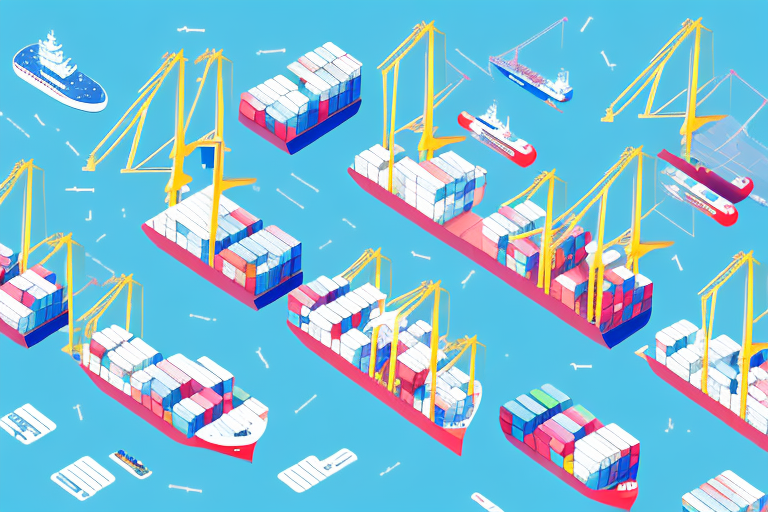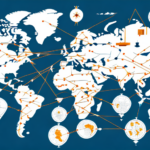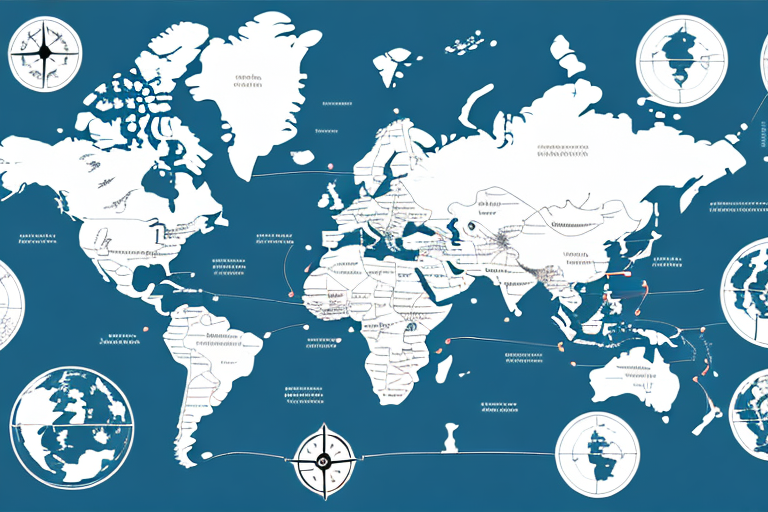Exploring the Benefits of a Foreign Trade Zone (FTZ)
Foreign Trade Zones (FTZs) are designated areas within a country where businesses can defer, reduce, or eliminate certain customs fees and taxes on imported or exported goods. The benefits of operating within an FTZ are numerous and can significantly impact a company's bottom line. In this article, we'll examine the advantages of FTZs, discuss how businesses can establish a presence within them, explore the economic impact of FTZs on local communities, delve into case studies, and consider their future in light of current global trade trends.
What is a Foreign Trade Zone (FTZ)?
An FTZ, sometimes referred to as a Free Trade Zone, is a designated area within a country where businesses can import or export goods without paying certain customs fees and taxes until the goods leave the zone and enter the domestic market. In the United States, the FTZ program is overseen by the Foreign-Trade Zones Board, a federal agency operating under the Department of Commerce.
FTZs are strategically located near ports, airports, or other transportation hubs, facilitating the efficient movement of goods in and out of the zone. Additionally, FTZs offer benefits such as streamlined customs procedures, reduced paperwork, and enhanced security for goods stored within the zone. These advantages make FTZs an attractive option for businesses aiming to reduce costs and improve efficiency in their international trade operations.
How Foreign Trade Zones (FTZs) are Regulated by the Government
The Foreign-Trade Zones Board regulates FTZs in the United States by ensuring that companies adhere to specific guidelines. These regulations include filing detailed paperwork with the governing agency and permitting government agencies access to the FTZ. Additionally, businesses operating within an FTZ must comply with stringent security and inventory control requirements to prevent tax evasion and product diversion.
Regular audits are conducted by the Foreign-Trade Zones Board to ensure compliance with regulations. These audits may involve inspections of inventory records, security measures, and adherence to trade laws and regulations.
While FTZs offer significant benefits, such as reduced tariffs and streamlined customs procedures, they come with strict government regulations and oversight. Companies must carefully consider the potential advantages and disadvantages before deciding to operate within an FTZ.
The History of Foreign Trade Zones (FTZs)
FTZs originated in the United States in the 1930s as a response to the Great Depression. Under the Roosevelt administration, the FTZ program was established to stimulate economic growth, create jobs, and promote international trade. Today, FTZs exist in over 130 countries worldwide, with many nations developing their own FTZ programs to foster economic development.
FTZs offer various benefits to businesses, including exemptions from certain taxes and duties on imported goods, streamlined customs procedures, and increased flexibility in managing inventory. These advantages have made FTZs appealing to companies seeking to reduce costs and enhance their supply chain efficiency. In recent years, the utilization of FTZs has grown significantly, with industries such as automotive, electronics, and pharmaceuticals being among the top users.
The Role of Foreign Trade Zones (FTZs) in International Trade
FTZs play a crucial role in international trade by providing a platform for businesses to import and export goods in a tax-efficient manner. By allowing businesses to defer or eliminate customs duties, FTZs enable companies to reduce their overall operating costs, providing a significant competitive advantage. Furthermore, FTZs help mitigate risks associated with international trade, such as currency fluctuations and changing regulatory environments.
In addition to cost-saving benefits, FTZs offer increased flexibility in supply chain management. By allowing for the storage and manipulation of goods within the zone, businesses can more easily adapt to changes in demand and supply. This flexibility is particularly beneficial in industries with seasonal or unpredictable demand patterns.
FTZs also positively impact local economies by attracting businesses, creating jobs, and stimulating economic growth. Additionally, FTZs can serve as hubs for innovation and collaboration, as businesses within the zone often work together to develop new products and technologies.
Advantages of Operating within a Foreign Trade Zone (FTZ)
The advantages of operating within an FTZ include:
- Cost Savings: By deferring or reducing customs fees and taxes, businesses can increase their profit margins and lower overall operating costs.
- Supply Chain Optimization: FTZs streamline supply chain operations, reducing the time required to receive and process imported goods.
- Regulatory Compliance: Operating within an FTZ ensures compliance with complex international trade regulations, reducing the risk of non-compliance fines and penalties.
- Access to Specialized Infrastructure: FTZs often feature specialized facilities, such as advanced warehouses and distribution centers, equipped with the latest technology and equipment.
- Value-Added Services: Services like packaging, labeling, and assembly are often available within FTZs, allowing businesses to customize products for specific markets.
- Flexibility and Agility: FTZs provide businesses with the ability to quickly respond to changes in the global marketplace, enhancing competitiveness in a globalized economy.
How to Establish a Business within a Foreign Trade Zone (FTZ)
Establishing a business within an FTZ involves several key steps:
- Site Selection: Choose a suitable location within the FTZ, often near major transportation hubs for ease of access.
- Application for FTZ Status: Submit a detailed application to the Foreign-Trade Zones Board, outlining business operations and compliance measures.
- Implement Security Measures: Ensure that secure facilities and inventory control systems are in place to protect goods and comply with regulatory requirements.
- Compliance with Regulatory Requirements: Adhere to customs and tax regulations, including regular reporting and participation in audits.
Businesses operating within an FTZ can benefit from reduced or eliminated tariffs, streamlined customs procedures, and access to foreign trade data. Proximity to ports and transportation infrastructure can also help reduce transportation costs and improve supply chain efficiency. However, it's essential to carefully weigh the costs and benefits, as well as the potential risks and challenges associated with international trade.
The Economic Impact of Foreign Trade Zones (FTZs) on Local Communities
FTZs can have a substantial positive economic impact on local communities by:
- Job Creation: Attracting businesses to the area leads to the creation of jobs, both directly within the FTZ and indirectly through supporting industries.
- Boosting Local Tax Revenues: Increased business activity contributes to higher tax revenues, which can be reinvested in community infrastructure and services.
- Promoting Economic Development: FTZs stimulate economic growth by attracting investment, fostering innovation, and encouraging the development of supply chain networks involving local suppliers and service providers.
Examples of Successful Companies Operating within a Foreign Trade Zone (FTZ)
Several prominent companies have established successful operations within FTZs, leveraging the benefits to enhance their global competitiveness:
- BMW: BMW operates a plant in South Carolina located within an FTZ, allowing the company to import components duty-free, thereby reducing production costs.
- Apple: Apple maintains multiple FTZ sites in the United States, facilitating the import of products for further assembly and distribution without immediate tariff liabilities.
- Intel: Intel uses FTZs to store and manage its semiconductor components, optimizing supply chain efficiency and reducing storage costs.
Challenges and Limitations Faced by Businesses Operating within a Foreign Trade Zone (FTZ)
While FTZs offer significant advantages, businesses may encounter various challenges and limitations, including:
- Regulatory Oversight: FTZs are subject to rigorous government regulations, and maintaining compliance requires ongoing attention and resources.
- Initial Investment: Establishing secure facilities and inventory control systems can be costly, posing a barrier for some businesses.
- Competition: Operating within an FTZ may involve competition from other companies in the same zone, as well as from those outside the FTZ offering similar products or services.
- Complexity of Operations: Navigating the regulatory landscape and managing operations within an FTZ can add complexity to business processes.
The Future of Foreign Trade Zones (FTZs) in Light of Current Global Trade Trends
Despite the challenges, FTZs are poised to continue playing a vital role in international trade due to trends such as globalization and increased trade liberalization. As businesses strive to reduce operating costs and enhance supply chain efficiency, FTZs offer an attractive solution. Additionally, FTZs help mitigate risks associated with international trade, such as fluctuating tariffs and shifting regulatory environments, making them valuable tools for businesses in today's global economy.
Emerging trends, such as the rise of e-commerce and the need for more flexible supply chains, further underscore the relevance of FTZs. The integration of advanced technologies like automation and data analytics within FTZs is expected to enhance their functionality and appeal to businesses seeking greater operational efficiency.
How to Maximize the Benefits of a Foreign Trade Zone (FTZ) for Your Business
To fully leverage the benefits of operating within an FTZ, businesses should:
- Conduct a Comprehensive Supply Chain Analysis: Assess customs duties, taxes, transportation costs, and the regulatory environment to identify areas for optimization.
- Utilize FTZ Advantages: Take advantage of supply chain optimization opportunities and tax deferral options to reduce costs and increase profit margins.
- Invest in Technology: Implement advanced inventory management and data analytics tools to enhance operational efficiency within the FTZ.
- Stay Informed on Regulations: Keep abreast of changes in trade laws and regulations to ensure continued compliance and avoid potential penalties.
- Foster Partnerships: Collaborate with other businesses within the FTZ to share resources, knowledge, and best practices.
Comparing and Contrasting the Benefits of a Free Trade Zone vs. a Foreign Trade Zone
While Free Trade Zones (FTAs) and Foreign Trade Zones (FTZs) share similarities, they differ significantly in scope and objectives:
- Scope: FTAs are typically broader in scope, aiming to eliminate tariffs and trade barriers between two or more countries. In contrast, FTZs are specific areas within a single country focused on reducing taxes and fees associated with importing and exporting goods.
- Objectives: FTAs seek to facilitate international trade on a larger scale by fostering cooperation between nations. FTZs, on the other hand, aim to enhance the competitiveness of businesses within a country by providing cost-saving opportunities.
- Establishment: FTAs are usually established through international agreements between countries, while FTZs are designated areas within a country managed by national or regional authorities.
Pitfalls to Avoid When Operating within a Foreign Trade Zone
Businesses operating within an FTZ should be mindful of common pitfalls to ensure successful operations:
- Non-Compliance: Failing to adhere to customs and tax regulations can result in significant fines and penalties. It's essential to maintain rigorous compliance practices.
- Poor Inventory Control: Inadequate inventory management can lead to inefficiencies and increased costs. Implementing robust inventory control systems is crucial.
- Lack of Security Measures: Insufficient security can result in theft, loss, or damage to goods. Investing in comprehensive security infrastructure is necessary to protect assets.
- Neglecting Regulatory Changes: Staying informed about changes in trade laws and regulations is vital to maintain compliance and avoid disruptions.
- Underestimating Costs: Initial setup and ongoing operational costs within an FTZ can be substantial. It's important to conduct thorough cost-benefit analyses before committing to an FTZ.
To avoid these pitfalls, businesses should invest in secure facilities, implement effective inventory control systems, ensure compliance with all relevant regulations, and conduct regular audits to identify and address potential issues proactively.
Case Studies: Examining the Impact of FTZs on Specific Industries or Regions
Numerous case studies highlight the positive impact of FTZs on various industries and regions:
- Electronics Industry: A study of the electronics sector found that FTZs significantly reduce production costs and enhance competitiveness by allowing companies to manage components and finished products efficiently.
- Automotive Industry: FTZs enable automotive manufacturers to streamline the import of parts and materials, reducing lead times and lowering overall production costs.
- Rural Economic Development: In rural regions, FTZs have attracted businesses by offering tax incentives and infrastructure benefits, leading to job creation and economic revitalization.
- Pharmaceutical Industry: FTZs facilitate the import of raw materials and the export of finished pharmaceutical products, enhancing global distribution capabilities.
These case studies demonstrate the versatility and effectiveness of FTZs in promoting economic growth, enhancing industry competitiveness, and supporting regional development.
Conclusion
In conclusion, operating within a Foreign Trade Zone can offer substantial advantages for businesses engaged in international trade. By reducing customs fees and taxes and optimizing supply chain operations, companies can lower operating costs and increase profit margins. Additionally, FTZs contribute to economic development and job growth in local communities. While there are challenges and limitations associated with operating within an FTZ, the ongoing trends of globalization and trade liberalization suggest that FTZs will continue to be a vital component of international trade strategies in the foreseeable future.






















